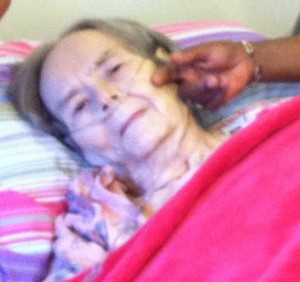If you’re like many people, Shakespeare isn’t at the top of your reading list. His works, however, contain many wise words. “Disturb him not, let him pass peaceably. They also serve who only stand and wait” comes from Henry VI, pt II, act III, scene 3. These are words family members and medical professionals would do well to keep in mind when someone they love is nearing the end of life.
Too often medical professionals treat people as a collection of reparable or replaceable parts rather than as a holistic living being. I saw this demonstrated when my father was dying. He had congestive heart failure as well as kidney failure when he fell and hit his head. By the time I got to the hospital he was no longer responsive, had no chance of recovery and yet the neurosurgeons were there presenting my mom the option of having them perform a craniotomy on him. Cutting into his skull wasn’t going to restore him to health, would have made his death more painful, and simply was a bad option. I waited for them to suggest hospice as an alternative, yet they only alluded in passing to the option of “keeping him comfortable.” When I told them no surgery and that we wanted a particular hospice, they looked at me as though I was making an outrageous request. My final words to them were, “I work for [the hospice] and I know what I’m looking at.”
Katy Butler sums it up nicely in Knocking on Heaven’s Door when she states that “…new technologies seem to have blunted medical staff to the suffering their procedures caused the dying, and often postponed death without restoring health.” I saw this in my mother’s final months. She had stopped breathing and was placed on a ventilator. By the time she left the hospital she was breathing on her own, but her health was never restored. Even with good care from hospice and from her assisted living staff, she remained angry about “having to live like this,” unable to care for herself and live any semblance of an independent life. I can’t tell you how often she asked me why dying was taking so long. I can tell you that six months is a long time.
Butler also notes that sometime after the 1950s attitudes shifted from faith in God and acceptance of death as the natural end of the life cycle to faith in medical science. Death became something to resist, to fight against. This view of death persists today as we’re bombarded with anti-aging formulas, cosmetics, fitness plans, and more.
What is the doctor’s moral role at patient’s end of life? Perhaps even more important: what is your role and how have you prepared to fulfill it?
 Todays Gray Matters Valuing the Wisdom & Purpose In Aging Well
Todays Gray Matters Valuing the Wisdom & Purpose In Aging Well
